Julien Chaumond
AfroDigits: A Community-Driven Spoken Digit Dataset for African Languages
Apr 04, 2023Abstract:The advancement of speech technologies has been remarkable, yet its integration with African languages remains limited due to the scarcity of African speech corpora. To address this issue, we present AfroDigits, a minimalist, community-driven dataset of spoken digits for African languages, currently covering 38 African languages. As a demonstration of the practical applications of AfroDigits, we conduct audio digit classification experiments on six African languages [Igbo (ibo), Yoruba (yor), Rundi (run), Oshiwambo (kua), Shona (sna), and Oromo (gax)] using the Wav2Vec2.0-Large and XLS-R models. Our experiments reveal a useful insight on the effect of mixing African speech corpora during finetuning. AfroDigits is the first published audio digit dataset for African languages and we believe it will, among other things, pave the way for Afro-centric speech applications such as the recognition of telephone numbers, and street numbers. We release the dataset and platform publicly at https://huggingface.co/datasets/chrisjay/crowd-speech-africa and https://huggingface.co/spaces/chrisjay/afro-speech respectively.
Evaluate & Evaluation on the Hub: Better Best Practices for Data and Model Measurements
Oct 06, 2022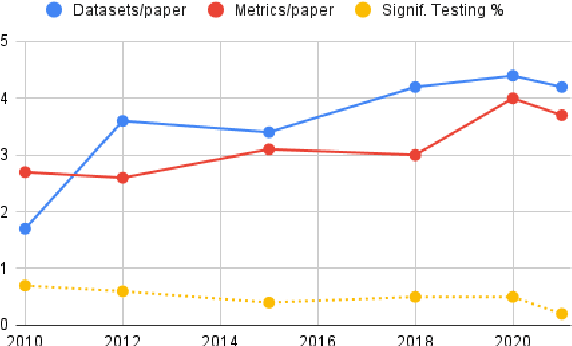
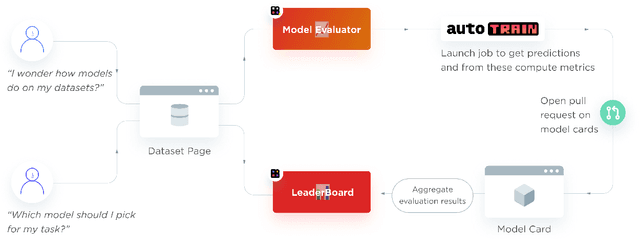
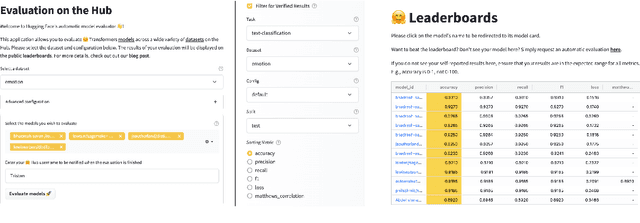
Abstract:Evaluation is a key part of machine learning (ML), yet there is a lack of support and tooling to enable its informed and systematic practice. We introduce Evaluate and Evaluation on the Hub --a set of tools to facilitate the evaluation of models and datasets in ML. Evaluate is a library to support best practices for measurements, metrics, and comparisons of data and models. Its goal is to support reproducibility of evaluation, centralize and document the evaluation process, and broaden evaluation to cover more facets of model performance. It includes over 50 efficient canonical implementations for a variety of domains and scenarios, interactive documentation, and the ability to easily share implementations and outcomes. The library is available at https://github.com/huggingface/evaluate. In addition, we introduce Evaluation on the Hub, a platform that enables the large-scale evaluation of over 75,000 models and 11,000 datasets on the Hugging Face Hub, for free, at the click of a button. Evaluation on the Hub is available at https://huggingface.co/autoevaluate.
Datasets: A Community Library for Natural Language Processing
Sep 07, 2021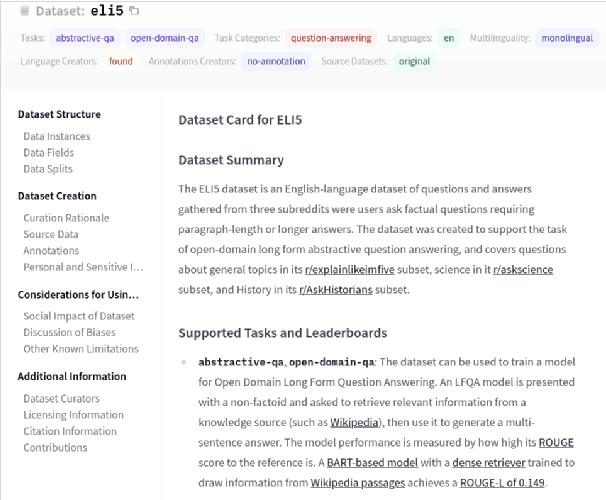
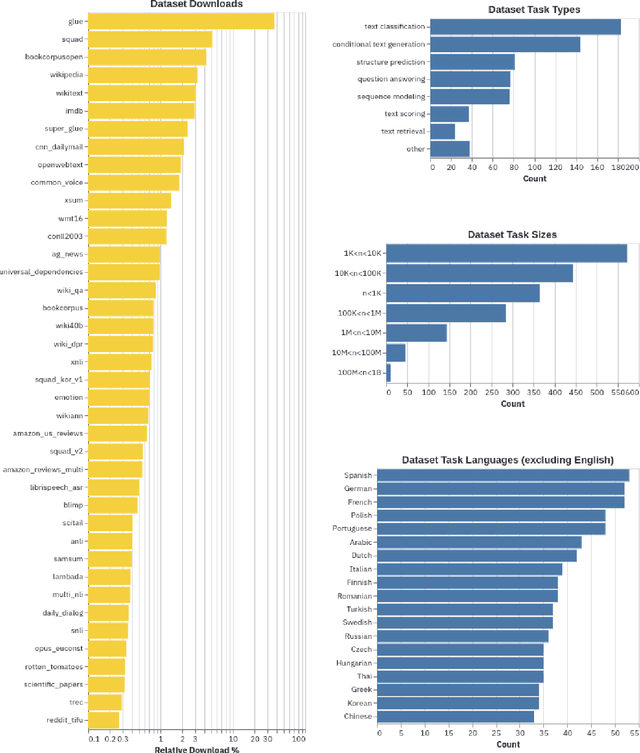
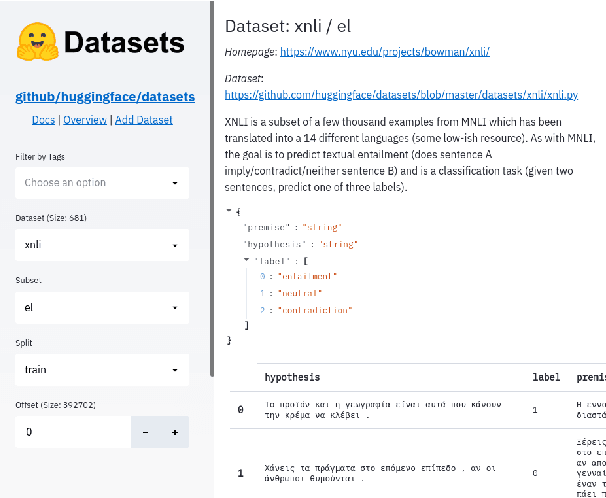
Abstract:The scale, variety, and quantity of publicly-available NLP datasets has grown rapidly as researchers propose new tasks, larger models, and novel benchmarks. Datasets is a community library for contemporary NLP designed to support this ecosystem. Datasets aims to standardize end-user interfaces, versioning, and documentation, while providing a lightweight front-end that behaves similarly for small datasets as for internet-scale corpora. The design of the library incorporates a distributed, community-driven approach to adding datasets and documenting usage. After a year of development, the library now includes more than 650 unique datasets, has more than 250 contributors, and has helped support a variety of novel cross-dataset research projects and shared tasks. The library is available at https://github.com/huggingface/datasets.
HuggingFace's Transformers: State-of-the-art Natural Language Processing
Oct 16, 2019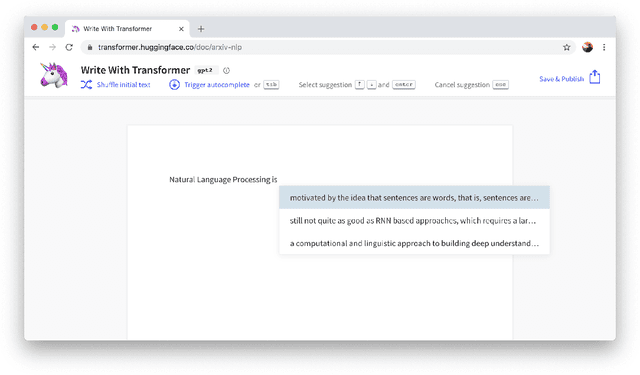
Abstract:Recent advances in modern Natural Language Processing (NLP) research have been dominated by the combination of Transfer Learning methods with large-scale language models, in particular based on the Transformer architecture. With them came a paradigm shift in NLP with the starting point for training a model on a downstream task moving from a blank specific model to a general-purpose pretrained architecture. Still, creating these general-purpose models remains an expensive and time-consuming process restricting the use of these methods to a small sub-set of the wider NLP community. In this paper, we present HuggingFace's Transformers library, a library for state-of-the-art NLP, making these developments available to the community by gathering state-of-the-art general-purpose pretrained models under a unified API together with an ecosystem of libraries, examples, tutorials and scripts targeting many downstream NLP tasks. HuggingFace's Transformers library features carefully crafted model implementations and high-performance pretrained weights for two main deep learning frameworks, PyTorch and TensorFlow, while supporting all the necessary tools to analyze, evaluate and use these models in downstream tasks such as text/token classification, questions answering and language generation among others. The library has gained significant organic traction and adoption among both the researcher and practitioner communities. We are committed at HuggingFace to pursue the efforts to develop this toolkit with the ambition of creating the standard library for building NLP systems.
DistilBERT, a distilled version of BERT: smaller, faster, cheaper and lighter
Oct 16, 2019


Abstract:As Transfer Learning from large-scale pre-trained models becomes more prevalent in Natural Language Processing (NLP), operating these large models in on-the-edge and/or under constrained computational training or inference budgets remains challenging. In this work, we propose a method to pre-train a smaller general-purpose language representation model, called DistilBERT, which can then be fine-tuned with good performances on a wide range of tasks like its larger counterparts. While most prior work investigated the use of distillation for building task-specific models, we leverage knowledge distillation during the pre-training phase and show that it is possible to reduce the size of a BERT model by 40%, while retaining 97% of its language understanding capabilities and being 60% faster. To leverage the inductive biases learned by larger models during pre-training, we introduce a triple loss combining language modeling, distillation and cosine-distance losses. Our smaller, faster and lighter model is cheaper to pre-train and we demonstrate its capabilities for on-device computations in a proof-of-concept experiment and a comparative on-device study.
TransferTransfo: A Transfer Learning Approach for Neural Network Based Conversational Agents
Feb 04, 2019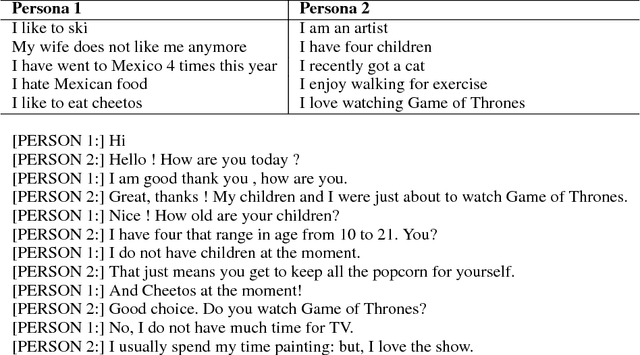

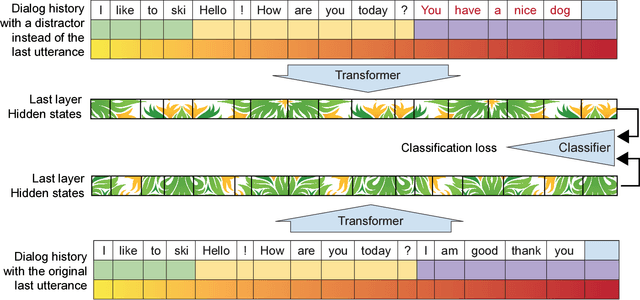

Abstract:We introduce a new approach to generative data-driven dialogue systems (e.g. chatbots) called TransferTransfo which is a combination of a Transfer learning based training scheme and a high-capacity Transformer model. Fine-tuning is performed by using a multi-task objective which combines several unsupervised prediction tasks. The resulting fine-tuned model shows strong improvements over the current state-of-the-art end-to-end conversational models like memory augmented seq2seq and information-retrieval models. On the privately held PERSONA-CHAT dataset of the Conversational Intelligence Challenge 2, this approach obtains a new state-of-the-art, with respective perplexity, Hits@1 and F1 metrics of 16.28 (45 % absolute improvement), 80.7 (46 % absolute improvement) and 19.5 (20 % absolute improvement).
Continuous Learning in a Hierarchical Multiscale Neural Network
May 15, 2018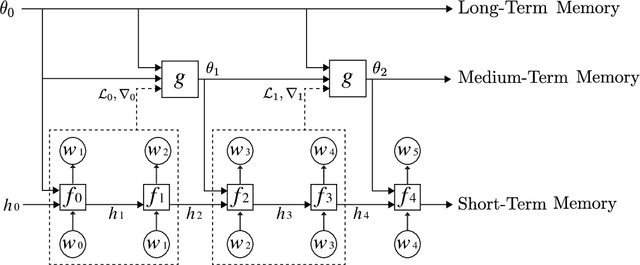
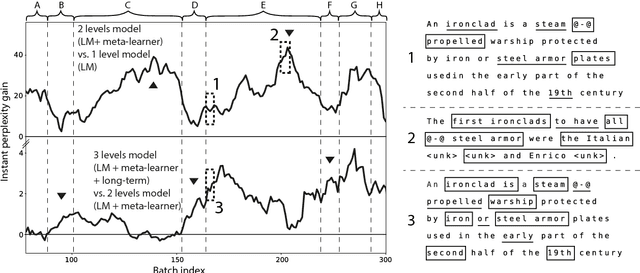
Abstract:We reformulate the problem of encoding a multi-scale representation of a sequence in a language model by casting it in a continuous learning framework. We propose a hierarchical multi-scale language model in which short time-scale dependencies are encoded in the hidden state of a lower-level recurrent neural network while longer time-scale dependencies are encoded in the dynamic of the lower-level network by having a meta-learner update the weights of the lower-level neural network in an online meta-learning fashion. We use elastic weights consolidation as a higher-level to prevent catastrophic forgetting in our continuous learning framework.
Meta-Learning a Dynamical Language Model
Mar 28, 2018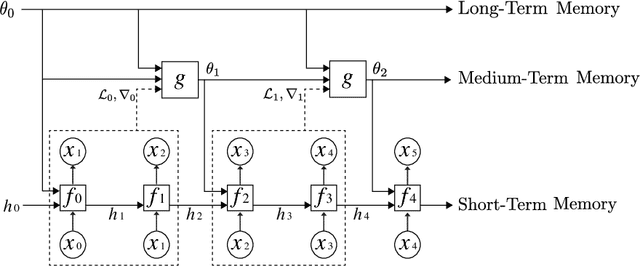
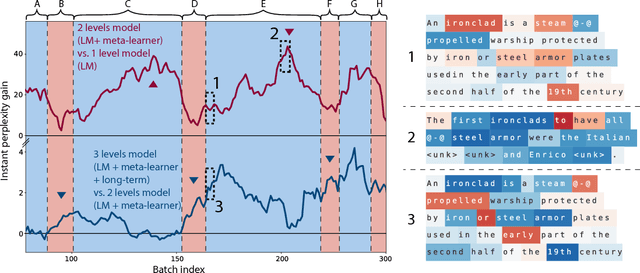
Abstract:We consider the task of word-level language modeling and study the possibility of combining hidden-states-based short-term representations with medium-term representations encoded in dynamical weights of a language model. Our work extends recent experiments on language models with dynamically evolving weights by casting the language modeling problem into an online learning-to-learn framework in which a meta-learner is trained by gradient-descent to continuously update a language model weights.
 Add to Chrome
Add to Chrome Add to Firefox
Add to Firefox Add to Edge
Add to Edge